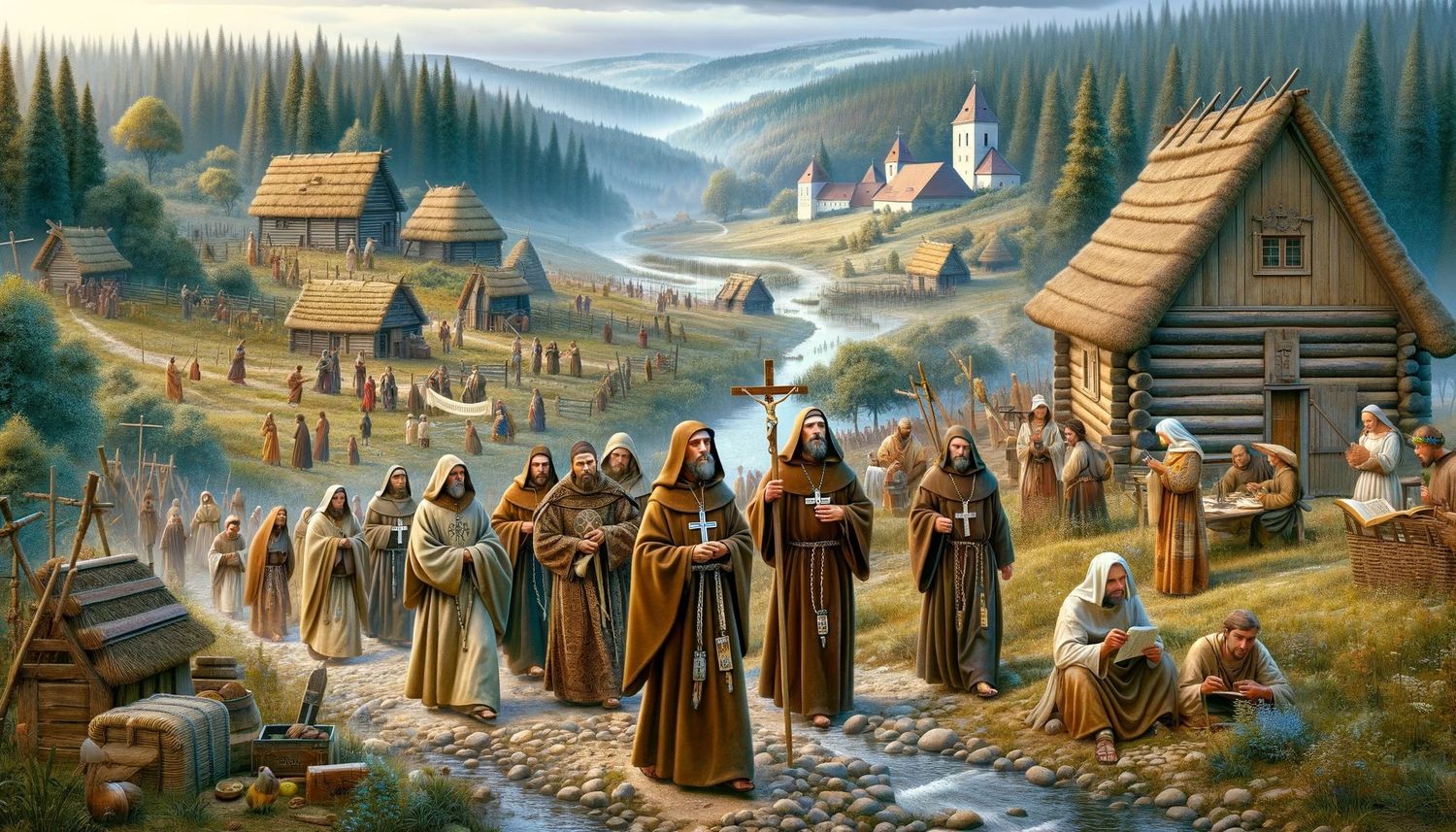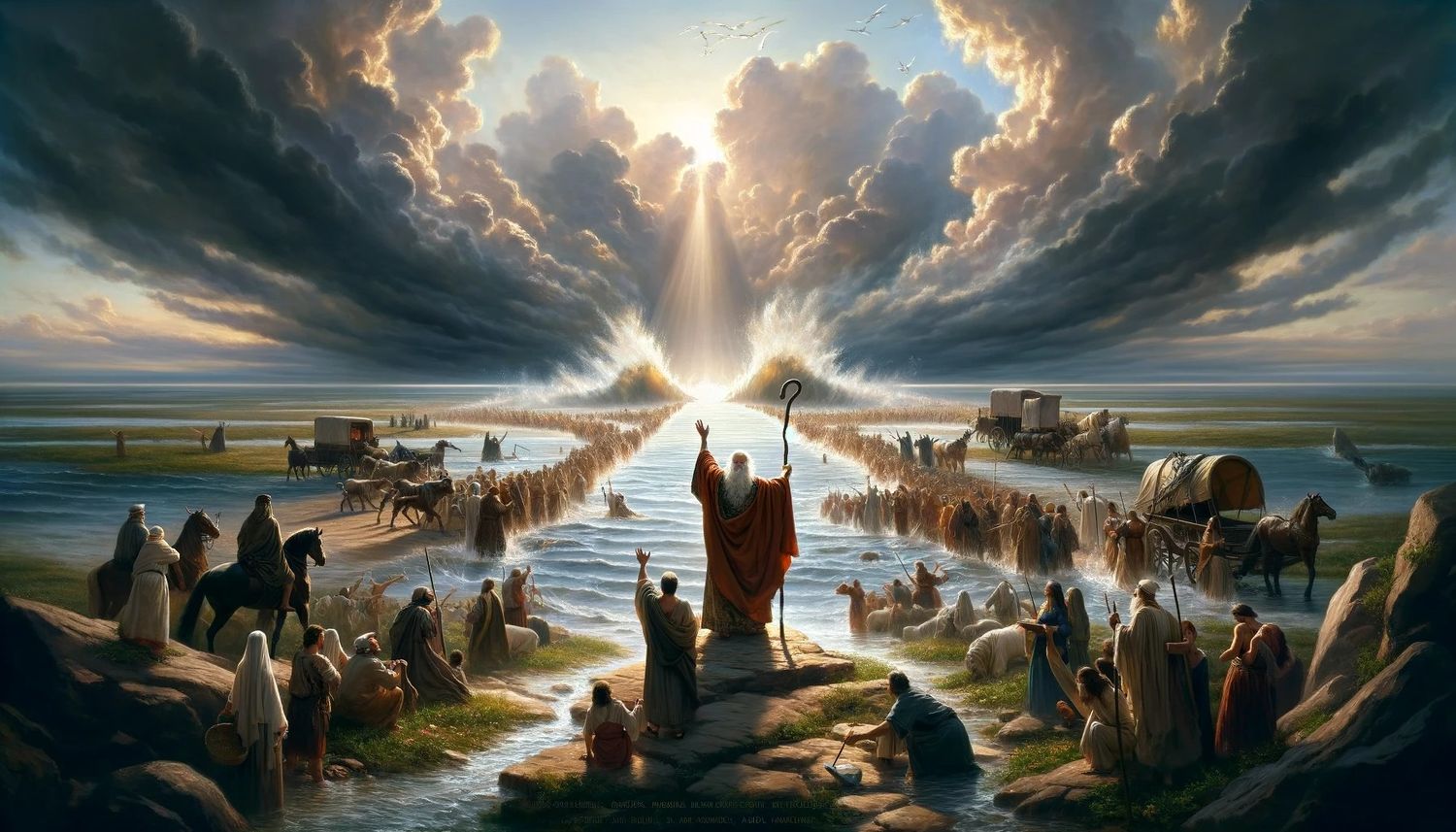Home>Theology and Spirituality>What Is The Baptism Of Poland


Theology and Spirituality
What Is The Baptism Of Poland
Published: February 28, 2024
Jason DeRose, Managing Editor at Christian.net, uses his expertise in religion and journalism to deepen understanding of faith's societal impacts. His editorial leadership, coupled with a strong academic background, enriches the platform’s diverse content, earning him recognition in both journalism and religious circles.
Discover the significance and history of the Baptism of Poland, a pivotal event in theology and spirituality. Explore its impact on the country and its people.
(Many of the links in this article redirect to a specific reviewed product. Your purchase of these products through affiliate links helps to generate commission for Christian.net, at no extra cost. Learn more)
Table of Contents
The Historical Significance of the Baptism of Poland
The Baptism of Poland, also known as the Christianization of Poland, refers to the event in 966 when the ruler of the Polans, Mieszko I, accepted Christianity and was baptized. This pivotal moment in Polish history marked the beginning of the country's association with the Christian faith. The significance of this event extends beyond religious conversion, as it had profound implications for the development of Polish identity, culture, and politics.
-
Unification of the Polish State: The Baptism of Poland played a crucial role in the unification of the Polish state. By embracing Christianity, Mieszko I sought to align his realm with the broader Christian world, thereby solidifying his authority and establishing Poland as a cohesive and recognized entity within Europe.
-
Cultural Transformation: The adoption of Christianity brought about a significant cultural transformation in Poland. It introduced new religious practices, artistic expressions, and architectural styles that were influenced by Christian traditions. The construction of churches and monasteries became emblematic of the Christian presence in Poland and contributed to the country's cultural landscape.
-
Integration into European Affairs: The Baptism of Poland facilitated the country's integration into European affairs. As a Christian nation, Poland became part of the wider Christian community, establishing diplomatic and religious ties with other European powers. This integration had far-reaching implications for Poland's political and economic development.
-
Enduring Symbolism: The Baptism of Poland has endured as a powerful symbol of national identity and unity. It represents the foundational moment in Polish history when the country embraced a faith that would shape its destiny for centuries to come. The baptism became a source of pride and a defining element of Polish heritage.
-
Legacy of Religious Tolerance: The Christianization of Poland also set the stage for a legacy of religious tolerance within the country. Over time, Poland became known for its relative acceptance of diverse religious communities, fostering an environment where different faiths could coexist.
The historical significance of the Baptism of Poland cannot be overstated. It marked the beginning of a new era for the Polish people, shaping their cultural, political, and religious landscape in profound ways. This pivotal event continues to resonate in the collective memory of the nation, serving as a testament to the enduring impact of Christianity on Polish history and identity.
Read more: Who Brought Catholicism To Poland
The Role of Christianity in Shaping Polish Culture
The role of Christianity in shaping Polish culture has been profound and far-reaching, leaving an indelible mark on the country's traditions, customs, and artistic expressions. The Christianization of Poland introduced a new set of values, beliefs, and practices that became deeply intertwined with the fabric of Polish society. Here are some key aspects of how Christianity has influenced and shaped Polish culture:
-
Religious Festivals and Traditions: Christianity brought a rich tapestry of religious festivals and traditions to Poland. Holidays such as Easter and Christmas became central to Polish cultural life, marked by unique customs, culinary delights, and vibrant celebrations. These religious festivities not only hold spiritual significance but also serve as occasions for families and communities to come together, reinforcing the bonds of Polish identity.
-
Art and Architecture: The influence of Christianity is evident in the realm of art and architecture in Poland. The construction of churches, cathedrals, and monasteries became a testament to the country's Christian heritage. These architectural marvels, adorned with intricate religious symbolism and artwork, stand as a testament to the enduring impact of Christianity on Polish artistic expression.
-
Literature and Music: Christianity has also played a pivotal role in shaping Polish literature and music. Religious themes and motifs have permeated the works of renowned Polish writers and composers, reflecting the profound influence of Christian narratives on the cultural imagination of the Polish people. From epic poems to choral compositions, the Christian faith has provided a rich source of inspiration for artistic expression in Poland.
-
Ethical and Moral Framework: The ethical and moral framework of Polish society has been significantly shaped by Christian teachings. Concepts of compassion, justice, and solidarity, rooted in Christian ethics, have informed the collective conscience of the Polish people. These values continue to underpin social norms and behaviors, contributing to the unique character of Polish culture.
-
Cultural Identity and Heritage: Christianity has become an integral part of the cultural identity and heritage of Poland. The fusion of Christian traditions with indigenous customs has given rise to a distinct Polish cultural identity, characterized by a deep reverence for religious heritage and a sense of communal solidarity.
The role of Christianity in shaping Polish culture extends beyond religious observance; it has become interwoven with the very essence of what it means to be Polish. The enduring legacy of Christianity in Poland is a testament to its profound impact on the country's cultural landscape, enriching the tapestry of Polish heritage with a vibrant array of religious, artistic, and ethical dimensions.
The Impact of the Baptism of Poland on Politics and Society
The Baptism of Poland had a profound impact on the political and social landscape of the country, shaping its governance, institutions, and societal norms in significant ways. The embrace of Christianity by Mieszko I and the subsequent Christianization of Poland ushered in a new era of political and social transformation, leaving a lasting imprint on the nation's development.
-
Centralization of Power: The Baptism of Poland played a pivotal role in the centralization of political power. By aligning with the Christian faith, Mieszko I sought to consolidate his authority and establish a unified state. This centralization of power laid the groundwork for the emergence of a cohesive political structure, enabling the governance of a territorially expanded and culturally diverse realm.
-
Ecclesiastical Influence: The Christianization of Poland brought about a significant increase in the influence of the Church in political affairs. The establishment of dioceses and the appointment of bishops contributed to the intertwining of religious and political authority. The Church played a crucial role in shaping the legal and ethical framework of Polish society, exerting influence over matters of governance and social conduct.
-
Legal Reforms: The adoption of Christianity led to the introduction of legal reforms that reflected Christian principles. The promulgation of laws and regulations influenced by Christian ethics contributed to the codification of a legal system that incorporated moral and religious precepts. This legal framework not only regulated societal conduct but also reinforced the Christian underpinnings of Polish governance.
-
Social Cohesion: The Christianization of Poland fostered a sense of social cohesion and collective identity. The Christian faith provided a unifying framework that transcended tribal affiliations and regional divisions, promoting a shared sense of belonging among the diverse populace. This cohesion laid the groundwork for the development of a cohesive Polish society with a common cultural and religious heritage.
-
International Relations: The Baptism of Poland had implications for the country's international relations. As a Christian nation, Poland forged diplomatic ties with other Christian states, contributing to its integration into the broader European political landscape. This facilitated alliances, trade agreements, and cultural exchanges, positioning Poland as an active participant in the geopolitical dynamics of medieval Europe.
-
Cultural Integration: The Christianization of Poland facilitated the integration of Christian cultural norms and practices into the fabric of Polish society. Christian rituals, traditions, and moral values became integral to the social tapestry, influencing customs, ceremonies, and interpersonal relationships. This cultural integration contributed to the formation of a distinct Polish Christian identity.
The impact of the Baptism of Poland on politics and society reverberated throughout the centuries, shaping the trajectory of the nation's development and leaving an enduring legacy. The fusion of Christianity with the political and social fabric of Poland laid the groundwork for a cohesive and culturally rich society, characterized by a unique blend of religious, political, and social influences.
The Spread of Christianity in Poland After the Baptism
The baptism of Mieszko I marked the beginning of the spread of Christianity in Poland, initiating a process of religious conversion and evangelization that would shape the spiritual landscape of the country. Following the baptism, the propagation of the Christian faith gained momentum, leading to the establishment of ecclesiastical structures, the construction of religious edifices, and the dissemination of Christian teachings across the Polish territories.
-
Establishment of Dioceses and Churches: In the wake of the baptism, dioceses were established in key regions of Poland, laying the foundation for the organizational structure of the Church. The construction of churches and cathedrals became emblematic of the Christian presence in Poland, serving as centers of religious worship and community life. These ecclesiastical institutions played a pivotal role in the dissemination of Christian doctrine and the administration of religious sacraments.
-
Missionary Endeavors: The spread of Christianity in Poland was propelled by missionary endeavors aimed at evangelizing the pagan populations. Missionaries, both from within Poland and from neighboring Christian realms, embarked on campaigns to proclaim the Christian message and convert the indigenous peoples. Their efforts contributed to the gradual expansion of Christian communities and the incorporation of pagan tribes into the Christian fold.
-
Integration of Indigenous Beliefs: The spread of Christianity in Poland involved a process of integrating indigenous beliefs and practices with Christian teachings. This syncretic approach facilitated the acceptance of Christianity among the native population, allowing for the preservation of certain cultural elements within the framework of the Christian faith. As a result, the spread of Christianity in Poland was characterized by a blending of traditional customs with Christian rituals and observances.
-
Educational Initiatives: The propagation of Christianity in Poland was accompanied by educational initiatives aimed at disseminating Christian knowledge and values. Monastic schools and centers of learning emerged, providing instruction in Christian doctrine, scripture, and theology. These educational efforts contributed to the cultivation of a literate clergy and the nurturing of a Christian intellectual tradition within Polish society.
-
Cultural Assimilation: The spread of Christianity in Poland led to a process of cultural assimilation, as Christian beliefs and practices became increasingly integrated into the fabric of Polish society. Christian rituals, ceremonies, and ethical precepts permeated the cultural milieu, influencing social norms, artistic expressions, and communal traditions. This cultural assimilation contributed to the gradual Christianization of the Polish populace and the consolidation of a Christian identity.
The spread of Christianity in Poland after the baptism of Mieszko I was a transformative process that reshaped the religious, cultural, and intellectual landscape of the country. The establishment of Christian institutions, the efforts of missionaries, and the integration of indigenous beliefs all contributed to the gradual diffusion of the Christian faith throughout the Polish territories, laying the groundwork for the enduring influence of Christianity in Polish history and society.
The Legacy of the Baptism of Poland in Modern Times
The legacy of the Baptism of Poland continues to reverberate in modern times, shaping the cultural, religious, and national identity of the Polish people. The events surrounding the Christianization of Poland have left an indelible mark on the country's historical consciousness, influencing contemporary perspectives and societal dynamics. The enduring legacy of the baptism manifests in various aspects of modern Polish society, serving as a foundational pillar that continues to inform the country's ethos and collective memory.
-
Cultural Continuity: The Christianization of Poland laid the groundwork for the development of a distinct cultural identity that endures to this day. The fusion of Christian traditions with indigenous customs has given rise to a rich tapestry of cultural expressions, from religious festivals to artistic endeavors, that reflect the enduring legacy of the Christian faith in shaping Polish culture.
-
National Identity: The baptism of Mieszko I and the subsequent Christianization of Poland have become emblematic of the nation's historical narrative, contributing to a sense of national identity and unity. The Christian faith has served as a unifying force, transcending regional differences and historical upheavals, and providing a common thread that binds the Polish people together.
-
Religious Heritage: The Christianization of Poland has bequeathed a profound religious heritage that continues to inform the spiritual landscape of the country. Christianity remains a fundamental aspect of Polish religious life, with the Catholic Church playing a central role in the lives of many Poles and contributing to the moral and ethical framework of the nation.
-
Historical Consciousness: The baptism of Poland serves as a touchstone for the nation's historical consciousness, symbolizing a pivotal moment in the country's journey and serving as a source of pride and identity. The legacy of the baptism is perpetuated through historical commemorations, cultural traditions, and educational initiatives that seek to preserve and transmit the significance of this foundational event to future generations.
-
Ethical Foundations: The Christianization of Poland has left an enduring imprint on the ethical and moral foundations of Polish society. Christian values and principles continue to inform social norms, ethical conduct, and public discourse, contributing to a sense of solidarity and communal responsibility within the fabric of Polish society.
-
International Influence: The legacy of the Baptism of Poland extends beyond national borders, influencing the country's international relations and its role within the broader European context. Poland's Christian heritage has contributed to its distinct position within the European Union and the global community, shaping its diplomatic engagements and cultural exchanges.
The legacy of the Baptism of Poland in modern times serves as a testament to the enduring impact of this pivotal historical event. Its influence permeates the cultural, religious, and national dimensions of Polish society, embodying a legacy that continues to resonate with contemporary generations and enrich the collective identity of the Polish people.















